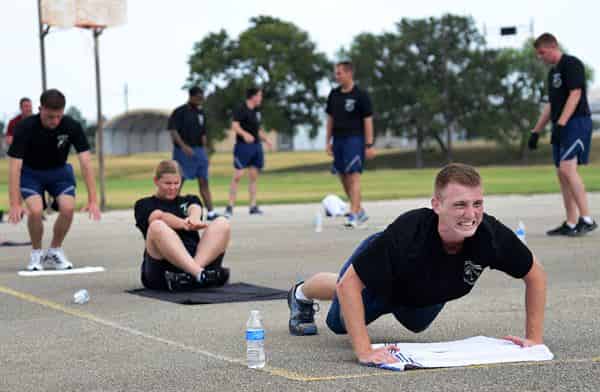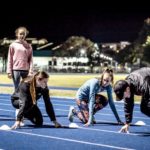WHAT IS OVERLOAD IN SPORTS TRAINING?
Overload in sports training During training, the load is given to the players as per their capacity whenever this load goes beyond the capability of an individual the physiological and psychological function of a sportsman get disturb this load does not affect immediate if the administration of the overload continuous for a longer period it leads causes to decrease in the performance capacity of an individual.
Some other definition of overload
IT IS THE STATE OF DECREASED PERFORMANCE CAPACITY OR PHENOMENA DISTURBANCE IN NORMAL NERVOUS ACTIVITY
Sports performance depends not only on muscular efficiency but mainly on the efficiency of the nervous system. When the nervous system gets disturb the optimum utilization of energy and metabolic process also gets disturbed. Another system of the body also does not perform to the best of their capacity.
Overloading is also called over-training it is beyond the capacity and ability of the sportspersons which leads to a decrease in performance. It happens because of some imbalance in intensity and volume of load and recovery. It should be avoided by the coach and a sportsman.
Overloading is of two types are as follows:-Overload In Sports Training
- The dominance of the excitation process: – when that training load is increased suddenly without adequate preparation.
- The dominance of the relaxation process when the overdose of the training load is administered continuously over a long period.
CAUSES OF OVERLOADING/SYMPTOMS OF OVERLOAD
The cause which leads to overloading can be discussed under the following four categories.
- Faulty training method
- Life-related factor
- Social related factor
- Health-related factor
FAULTY TRAINING METHOD:-
- If the recovery is ignored about training load it may cause overload.
- With the rapid increase in the training load the adaptation does not take place.
- The high volume of load with maximum or some maximum intensity.
- Forced technical training involving complicated movements without adequate rest.
- Excess of competition with high demands.
LIFE FACTORS:-
- Insufficient night rest or sleep.
- The irregular daily routine of work.
- Bad living conditions. Faulty leisure time activity.
- Quarrel in the family or community.
SOCIAL RELATED FACTOR:-
- Too many engagements in family work.
- Friction in the family. Unsatisfied Professional Studies.
- Misunderstanding with colleagues.
- Overloading in professional work or studies.
- The negative attitude of society towards the sport.
- Excess of entertainment.
HEALTH-RELATED FACTOR:-
- Any kind of Fever.
- Disturbance in the digestive system.
- Any kind of Infectious disease.
Symptoms of overload
Following symptoms can appear in respective order
PSYCHOLOGICAL RELATED SYMPTOMS:-
- The tendency towards hysteria [over excited]
- Increased sensitivity and criticism.
- Depression [a feeling of unhappiness for a long period]
- Loss of confidence.
- Loss of motivation.
PERFORMANCE RELATED SYMPTOMS:-
- The decrease in coordinated efficiency.
- The decrease in concentration ability.
- Decrease differentiation ability.
- The decrease in strength speed and endurance abilities.
- Delayed in the recovery process.
- Decrease competition readiness.
- Increased tendency to surrender in competition.
- Uncontrolled behavior and competition.
SOMATIC FUNCTIONAL:-
- Loss of sleep.
- Loss of weight.
- Disturbance indigestion.
- Frequent giddiness.
- Susceptibility to injuries.
How to overcome overload in sports training:-
The teamwork of a coach, sportsperson, sports doctor, and sports psychologist coach recognizes by State of overloading in the early stage if signs are found then:-
- Complete rest is not advisable.
- Recognize the causes as early as possible.
- The training load should be reduced carefully.
- A good diet, good massage general excise be adopted to accelerate the process of recovery.
- Modify the training.
- We start the training with a revised plan.
- Avoid trails and competition.
Overload In Sports Training
MEANS OF RECOVERY:-
The means which can be effective in accelerating recovery can be divided into the following groups:-
- Training measure
- Nutritional measure
- Physio-therapeutic measure
- Psychological measure
TRAINING MEASURE:-
Among all the four above groups, these means are the most important for ensuring a quick recovery. Other means of recovery should support the training methodical means.
- SESSION TRAINING: – A training session should be carefully worked out of ensuring recovery. The following should be kept in mind.
- WARM-UP: – A good session of warming up is essential for avoiding the earliest one set of fatigue. The stretching exercise which forms an essential part of the warm-up session is effective in preventing stiffness and soreness in the muscle.
- EXERCISE SEQUENCE: – The exercise to be performed should be arranged in sequence so that different muscle group organs and systems are stressed in rotation. This sequence can help in delaying one set of fatigue and guarantees quick recovery.
- SEQUENCE OF PERFORMANCE TASK: – In addition to exercise, the performance task should be arranged in sequence. In the training session the speed, co-coordinated abilities, and techniques should be developed first followed by strength. The endurance training should be at the end of the session.
- PHASE OF BEST BETWEEN REPETITION LOAD:– Between repetition load, measured measure rest periods should be provided to make the Lord effective and also makes the sports person capable of completing that’s training schedule. Active rest pauses [doing low-intensity exercise during rest pauses] ensure a fast recovery.
- LIMBERING DOWN:- every training session shall end with limbering down which should be done for 10 to 20 minutes to recover and bring the body back to the normal level of functioning. During limbering down, low-intensity continuous exercise should be performed to quickly remove the metabolic products from muscles and blood.
- CYCLIC PROCESS OF TRAINING: – This is divided into a cycle of training of varying duration.
Macrocycle:-
It is the longest cycle and its duration is from 3 to 12 months. It is divided into preparatory, competition, and transition periods. The transition period of 4 TO 6 weeks ensures recovery because during this phase training loads are low of intensity and volume. This phase provides recovery and relaxation of sportsperson after Strenuous training during preparatory and competition periods.
Mesocycle:-
The duration of this cycle is 3 to 6 weeks. The last week of the mesocycle is devoted to recovery. During the week last week, the training load is low, and general exercise dominate.
Micro cycle:-
IT is the shortest of the three cycles and its duration is normally one week. On the last day of the week, complete rest is provided to ensure recovery.
During this cycle, the training load fluctuates and is applied with a certain rhythm. During these cycles, the training tough should be tackled in a way that speed and technique come in the beginning and endurance comes at the end.
2- NUTRITIONAL MEASURE
During and after training and competition nutritional means taken in proper form and required quantity can help in ensuring faster recovery. The sportsperson should take a balanced diet, according to the requirement of the body and the sports for which one is training. After every training session light liquid diet containing carbohydrates, vitamins and minerals should be consumed. Intake of drinks which salt added is also recommended if during a training session the sportsperson had profuse sweating. It is also advised that meals should be consumed at fixed hours.
3- PHYSIO-THERAPEUTIC MEASURE
These means are bring effectively used for accelerating recovery. Different massage manipulation, Sauna, ultrasound therapy, hydrotherapy, electrotherapy, etc. are helpful in quick recovery. For these means, the help of a specialist should be taken in over to avoid problems. These means should be used in addition to means related to training methodology. Avoiding using them as substitute means of training methodical means.
4- PSYCHOLOGICAL MEASURE
Over the years, psychological means have become important in helping Sports in attaining faster recovery. Psychological evidence shows that the recovery process is controlled by the nervous system of the body and the psychological means help in the voluntary control of this system for attaining quick recovery. Psychological means, like other names, can be used during and after training for a competition and they can even be used in a training session for relaxation and ensuring sound sleep. Some of the important means which are being commonly used by sportsperson to overcome overload are:
- DIFFERENT FORMS OF YOGA
- AUTOGENOUSLY TRAINING.[personal relaxation]
- AUTO- SUGGESTION
- PROGRESSIVE RELAXATION TECHNIQUES
To learn and use these means to the best advantages, the sportsperson may take the help of the specialist. After having learned them correctly, he may indefinitely use them in overload.
Read more
https://www.sportzyogi.com/training-load-and-recovery/





